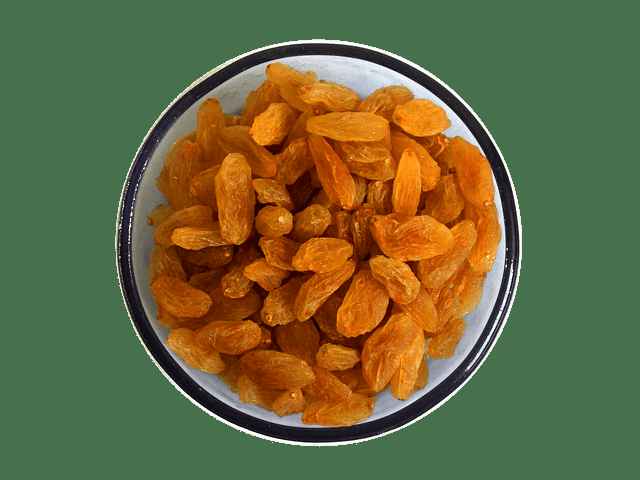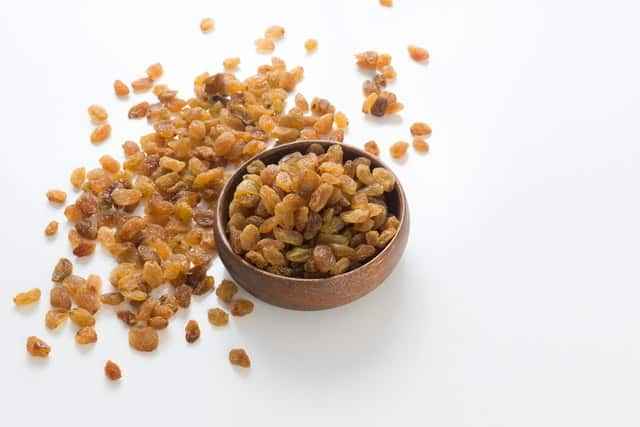Red foods are well known to be beneficial for diabetics. They not only assist in lowering blood sugar levels but also in controlling the pancreatic production of insulin. Raisins are definitely no different.
Dried fruit consumption, including that of raisins, sultanas, currants, dates, and prunes, has been linked to a lower incidence of type 2 diabetes (T2D). Raisins are said by some to be beneficial for diabetes and various illnesses in general. How can we know this, though?
This post will discuss the health advantages of raisins and how consuming them can help prevent diabetes. Raisins are actually quite beneficial for those with diabetes and are a healthy food choice.
Are Raisins Able to Stop Your Blood Sugar from Increasing?

Raisins are sun-dried grapes that are frequently consumed straight as a snack or as an ingredient in specific cakes and granola recipes. Of course, there are many different types of raisins depending on the grape, but in general, raisins are dried grapes with a deeper color. But if you have diabetes, are there any negative repercussions from consuming them?
Is it wise to steer clear? According to a study, raisins’ soluble fiber can help treat diabetes by lowering blood sugar levels. This enhances insulin sensitivity and aids in blood sugar regulation.
Sun-dried grapes have a lot of fiber and are a fantastic source of antioxidants. Pectin, a soluble fiber found in raisins, has no effect on blood sugar levels.
Raisins contribute to the management of diabetes by lowering blood sugar levels. In addition to having a high fiber content, raisins also have a low glycemic index. Therefore, consuming raisins won’t cause you to feel “hangry” or hungry when your blood sugar is below normal.
To state it once again, raisins are a great source of fiber, iron, and magnesium—all of which are necessary for a body in good health. To learn more about the benefits of eating raisins, read this article. Do you have diabetes and need to bring your blood sugar down? This is a list of fruits that will lessen the problems associated with diabetes.
According to one study, individuals with Type 1 diabetes who consumed a full cup of food every day experienced better blood sugar control without requiring more insulin. A second randomised, double-blind research discovered that diabetics could only improve their glycemic control by consuming 7.5g of dried plums.
A diet rich in Omega-3 fatty acids has been demonstrated to lower blood sugar levels, which makes sense considering that ARA increases the uptake of glucose into cells.
A recent study by Amin Esfahani, Joanne Lam, and Cyril W. C. Kendall examined the short-term impacts of raisin eating on insulin and glucose responses. According to their research, eating raisins reduced fasting glucose levels by 35% in those with Type 2 Diabetes after 15 weeks, and it was also usually beneficial in easing the symptoms of the disease.
For example, eating the same number of raisins reduced blood sugar levels in people with type 1 diabetes by just about 17%.
Snacking on Raisins in a Healthful Way
They can be consumed at any time as part of a healthy diet plan because of their high fiber and water content. They go well with other foods strong in protein and fiber, like brown rice and almonds. Raisins taste fantastic in salads, granola, and even a delicious oatmeal bar.
A Recipe for Delicious Granola with Raisins
- Four cups of granola cereal or Ezekiel 4:9 Crackers
- ½ bag (about 1 ⅘ cup) raisins
- Two to four tablespoons of butter (I use unsalted, but if you’d prefer, you may use coconut or olive oil instead)
- One teaspoon of cinnamon
- A pinch of salt, or two tablespoons if preferred
Guidelines
- Set oven temperature to 350°F.
- Grease a baking sheet very lightly with cooking spray or melt butter and put it aside.
- Heat the tap water in a medium saucepan until it reaches 110 degrees, about 1 to 2 inches over the bottom.
- Stir everything together until every grain has a generous coating of raisins.
- Disperse across a baking sheet.
- Bake for 12 to 16 minutes at 300 degrees.
When they’re done, chop them up and store them in containers or Ziploc bags in a cold, dark location until you’re ready to consume them. This is a fantastic dish for a Sunday morning, when folks may bake the granola in the final minute before heading off on their blood sugar roller coaster, which begins as soon as lunch is over.
Everything in Moderation
Less is more, just like with many health-promoting foods. Although raisins have several health benefits, eating too many of them is not advised.
While raisins are a great sugary treat, it may not be a good idea for diabetics to eat them at specific points of their diet. When and why then should we abstain from eating raisins? Because raisins have a high fructose content, they may raise blood sugar levels in diabetics.
The main ingredient in raisins is dried grapes, specifically raisins, which differ depending on the brand. Researchers studying raisins in northern France have found that although these little spherical, sun-dried fruits contain carbs like other fruits and table sugar (sucrose), they also naturally contain fructose, a form of sugar that has been traditionally connected to negative health effects.
The impact of fructose on elevating the risk of cardiometabolic disorders is a topic of debate in the field of nutritional health. Health professionals advise limiting carbohydrates—primarily carbohydrates—other than in moderation throughout the course of diabetes.
With this one exception—raisins are a great source of dietary fiber, which in ordinarily healthy people may result in excessive blood sugar levels—we would strongly encourage diabetics to incorporate them into their diet plans.
Dietary fiber, which is abundant in raisins, is necessary for the digestive system to operate properly and for the body to regularly eliminate fiber from the body. Increased daily consumption of high-quality fiber foods, such as dried fruit, can help maintain a healthy level by enhancing the efficiency of digestion, controlling bowel movements, and encouraging regular stomach motions.
It is an excellent source of iron and vitamin C, both of which are necessary for the healthy operation of certain body cells that aid in blood clotting.
In addition to giving muscles energy during insulin function, these vitamins also prevent blood clots during vital times like childbirth or surgery, when substantial amounts of certain vitamins—iron in particular—may not be easily accessible. According to the findings of their research, Esfahani, Lam, and Kendall.
Long-term research is necessary, but this study shows that raisins can also sharply improve postprandial glycaemic control. Furthermore, because raisins are low in glycemic index, they can be a healthy snack in moderation for people in good health as well as those with diabetes or impaired glucose tolerance.
Put another way, there are more advantages to raisins than disadvantages for those with diabetes.
Read Also: The Great Grape Debate: Is It Possible for Diabetics to Eat Grapes?
In summary
It should go without saying, but if you have diabetes, you should always speak with a professional about your nutritional needs. If required, your doctor could recommend switching to a different medicine or altering your diet to help you control your blood sugar. Testing for things like liver enzymes and renal function is a good idea every now and then in case something goes wrong with your health.
Those who were diagnosed with diabetes after the trial started or who already had the disease have an increased risk of dying. Before beginning any new diet, consult your doctor to find out whether there are any potential adverse effects, like nausea, vomiting, or itching when wearing contact lenses.
Although they can be consumed together, dehydrated fruits shouldn’t be taken at the same time unless previously discussed with a healthcare professional due to common medications. It is advised that you wait to give raisins to your children until they are at least five years old. They contain too much sugar for kids to handle, and it could be dangerous for small babies to choke on them.

We have discussed the health advantages of raisins for diabetics in this article. We’ve also offered you a sample of the healthful approach to incorporate raisins into your diet. It’s crucial to remember that, despite their health benefits, raisins should only be consumed occasionally.
As usual, we stress how crucial it is to discuss any concerns regarding your nutrition with your physician or other healthcare expert. Maintaining control over your blood sugar levels is crucial to combating diabetes.
What’s the lesson, then? Raisins have many health benefits, but it’s best to err on the side of caution and always get medical advice. Balance is still important. However, raisins might assist you in maintaining your health if consumed in moderation.


Be the first to comment on "Do Raisins Help People with Diabetes?"